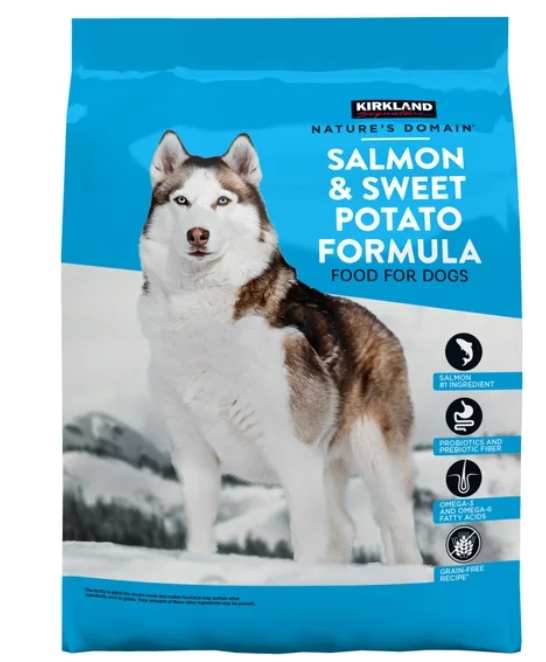
Kirkland Signature Nature’s Domain Salmon & Sweet Potato Formula Dog Food, 35 lbs
- Salmon & Sweet Potato Formula
- Grain-Free
- 35 lb Bag
Discovering Premium Nutrition Without the Premium Price Tag
There’s something about the bond between humans and their canine companions that transcends the ordinary pet-owner relationship. We share our homes, our hearts, and sometimes even our beds with these four-legged family members. So when it comes to their nutrition, many of us find ourselves standing in the pet food aisle, scrutinizing labels and questioning ingredients with the same intensity we might apply to our own meals.
I still remember the day I found myself in exactly this position, staring at the towering shelves of dog food options at my local Costco. My Golden Retriever, Max, had been experiencing some digestive issues, and my vet had suggested switching to a salmon-based formula. That’s when the distinctive blue bag of Kirkland Signature Salmon Dog Food caught my eye.
Fast forward three years, and I’ve become something of an unofficial expert on this particular product. What started as a simple dietary change for my dog has evolved into countless conversations with fellow pet parents, deep dives into nutritional research, and a genuine appreciation for what this food offers. Today, I’m sharing everything I’ve learned about what many consider to be one of the best-kept secrets in premium dog nutrition.
The Ingredient Breakdown: What’s Really in the Bag?
Let’s start with the most fundamental question: what exactly goes into Kirkland Salmon Dog Food? The answer might surprise those who associate store brands with lower quality.
The first ingredient—and this is crucial—is real, deboned salmon. Not salmon meal, not salmon flavoring, but actual salmon. This distinction matters significantly because in pet food ingredients, the items are listed by weight. When real meat takes the top spot, you know you’re getting a protein-focused formula.
Following the salmon, you’ll find:
- Sweet potatoes
- Peas
- Potatoes
- Canola oil
- Egg product
- Natural flavors
- Various vitamins and minerals
What’s equally important is what you won’t find: no artificial colors, no artificial flavors, and no artificial preservatives. The formula also excludes common fillers like corn, wheat, and soy that can trigger allergies in sensitive dogs.
For pet parents concerned about grain content, it’s worth noting that Kirkland Salmon Dog Food is indeed grain-free. While the grain-free debate continues in veterinary circles (with some studies suggesting potential links between grain-free diets and heart issues in certain dogs), many veterinarians still recommend grain-free options for dogs with specific sensitivities or allergies.
Nutritional Profile: More Than Just Protein
While protein often steals the spotlight in dog food discussions, a truly premium formula delivers a complete nutritional package. The Kirkland Salmon formula contains approximately 27% protein, which exceeds the AAFCO (Association of American Feed Control Officials) minimum requirements for adult maintenance.
But the benefits extend far beyond protein content. The omega-3 fatty acids naturally present in salmon support:
- Healthy skin and coat (goodbye, dull fur and dandruff!)
- Anti-inflammatory processes in the body
- Cognitive function, particularly important for aging dogs
- Joint health and mobility
The formula also provides a balanced ratio of calcium and phosphorus for bone health, antioxidants for immune support, and fiber for digestive health. At approximately 370 calories per cup, it’s also appropriately calorie-dense without crossing into excessive territory.
For those tracking specific nutritional values, the guaranteed analysis typically shows:
- Crude Protein: 27% minimum
- Crude Fat: 15% minimum
- Crude Fiber: 5% maximum
- Moisture: 10% maximum
- Omega-6 Fatty Acids: 2.5% minimum
- Omega-3 Fatty Acids: 0.5% minimum
These numbers place Kirkland Salmon Dog Food firmly in the premium category, comparable to brands that often cost significantly more.
The Value Proposition: Premium Nutrition at Warehouse Prices
Let’s address the elephant in the room: cost matters. Premium dog food can strain a budget, especially for multi-dog households or those with larger breeds. This is where Kirkland Signature products truly shine.
At Costco, a 35-pound bag of Kirkland Salmon Dog Food typically costs between $39.99 and $45.99, depending on your location. This translates to approximately $1.15-$1.31 per pound—roughly half the cost of comparable premium brands.
For context, similar salmon-based formulas from brands like Blue Buffalo, Taste of the Wild, or Purina Pro Plan can cost $2.00-$3.00 per pound. Over the course of a year, for a medium-sized dog consuming about 30 pounds of food monthly, the savings could exceed $500.
Does this dramatic price difference indicate a quality compromise? The evidence suggests otherwise. Kirkland Signature pet foods are manufactured by Diamond Pet Foods, the same company that produces several well-regarded premium brands. The economies of scale achieved through Costco’s warehouse model, combined with reduced marketing expenses, account for much of the price difference.
Sensitivity Solutions: A Gentle Option for Delicate Digestive Systems
One of the most common reasons pet owners seek out salmon-based formulas is digestive sensitivity. Traditional chicken or beef formulas can trigger inflammatory responses in some dogs, leading to symptoms like:
- Excessive itching
- Hot spots
- Ear infections
- Gastrointestinal upset
- Poor coat quality
The switch to a novel protein source like salmon often provides relief, and the Kirkland formula specifically seems to excel in this arena. Numerous online reviews and veterinary discussions highlight this food’s suitability for dogs with sensitive stomachs.
The absence of common allergens like corn, wheat, and soy further enhances its compatibility with sensitive systems. The inclusion of sweet potatoes and peas provides easily digestible carbohydrate sources, while the natural fiber helps regulate digestion.
My own experience mirrors these findings. After switching Max to the Kirkland Salmon formula, his previously chronic ear infections virtually disappeared, and his occasional digestive upsets became rare occurrences. The transformation wasn’t overnight—it took about three weeks to see significant improvements—but the change was undeniable.
Breed Considerations: One Size Fits Most, But Not All
Dog breeds vary dramatically in size, energy levels, and nutritional needs. While Kirkland Salmon Dog Food is marketed as suitable for all adult breeds, there are some nuances worth considering.
For small breeds with higher metabolic rates, the calorie density of this formula works well, though portion control becomes crucial to prevent weight gain. The kibble size may present a challenge for the tiniest breeds, but most manage without difficulty.
Medium breeds often hit the sweet spot with this formula, receiving balanced nutrition without requiring excessive quantities.
Large and giant breeds generally do well on the salmon formula, though those prone to joint issues may benefit from supplemental glucosamine and chondroitin beyond what’s provided in the food.
Working dogs and highly active breeds may require larger portions to maintain weight and energy levels, making the economical pricing particularly beneficial.
It’s worth noting that Kirkland does not currently offer a salmon-based puppy formula. Puppies have specific nutritional requirements—particularly regarding calcium-phosphorus ratios and DHA for brain development—that differ from adult needs. While some pet owners report successfully raising puppies on the adult salmon formula with veterinary supervision, it’s generally recommended to use a dedicated puppy formula during the first 12-18 months of life.
Comparing to the Competition: How Does It Stack Up?
The pet food market has exploded with options in recent years, making direct comparisons increasingly complex. However, several key metrics help position Kirkland Salmon Dog Food within the competitive landscape.
When compared to other premium grain-free salmon formulas, Kirkland offers:
- Comparable protein content (27% vs. 25-30% in competing brands)
- Similar omega fatty acid profiles
- Equivalent vitamin and mineral fortification
- No artificial preservatives, colors, or flavors (matching premium brand standards)
- AAFCO certification for complete and balanced nutrition
- Significantly lower cost per pound
Where some ultra-premium brands might edge ahead is in the inclusion of specialized ingredients like glucosamine, chondroitin, probiotics, or specialized antioxidant blends. However, these differences are often marginal and can be addressed through supplementation if needed for a specific dog’s health concerns.
One aspect where Kirkland does not compete is in formula variety. While brands like Blue Buffalo or Taste of the Wild offer multiple protein options within their grain-free lines, Kirkland’s options are more limited. For dogs that respond exceptionally well to salmon but need occasional variety, this could be a consideration.
Made in the USA: Production and Quality Control
Manufacturing origin has become increasingly important to pet owners, particularly following past recalls associated with imported ingredients. Kirkland Salmon Dog Food is proudly made in the USA, with production facilities primarily located in California, South Carolina, and Missouri.
Diamond Pet Foods, the manufacturer behind Kirkland pet products, maintains rigorous quality control processes including:
- Ingredient testing before production
- Multiple quality checks throughout the manufacturing process
- Finished product testing
- Regular facility audits and inspections
The company has invested significantly in food safety technologies and practices, particularly following a voluntary recall in 2012 related to potential Salmonella concerns. Current manufacturing practices meet or exceed FDA and AAFCO guidelines.
For those concerned about sustainability, it’s worth noting that Diamond Pet Foods has implemented several environmentally friendly initiatives, including water conservation programs and sustainable packaging developments. While not specifically marketed as an eco-friendly product, Kirkland Salmon Dog Food does maintain certain environmental standards in its production.
Shelf Life and Storage: Keeping It Fresh
A 35-pound bag represents a significant investment, even at Kirkland’s reasonable prices. Proper storage becomes essential to maintain nutritional integrity and prevent spoilage.
The typical shelf life for unopened Kirkland Salmon Dog Food is approximately 12-18 months from the production date, which should be printed on the bag. Once opened, the food should ideally be used within 6 weeks, though proper storage can extend this slightly.
For optimal freshness:
- Store in a cool, dry place away from direct sunlight
- After opening, transfer food to an airtight container rather than rolling the bag
- If using the original bag, seal it thoroughly between uses
- Consider freezing portions if you have a small dog who won’t consume the bag quickly
The natural preservatives used (mixed tocopherols, which are vitamin E derivatives) are effective but less potent than artificial alternatives, making proper storage particularly important.
Beyond the Bag: Availability and Purchasing Options
The primary retail source for Kirkland Signature products, including their salmon dog food, is Costco warehouse stores. A Costco membership ($60-$120 annually) is typically required for in-store purchases, though this cost is quickly offset by savings for regular purchasers.
For those without convenient access to a physical Costco location, several options exist:
- Costco.com offers online purchasing for members, though prices may be slightly higher than in-store and shipping costs may apply
- Instacart and similar delivery services can deliver from local Costco stores in many areas
- Amazon occasionally carries Kirkland pet products, though prices are typically marked up considerably
One purchasing strategy some pet owners employ is to coordinate with friends or family who have Costco memberships for occasional bulk purchases. Others find the membership worthwhile simply for the pet food savings, particularly in multi-pet households.
Kirkland Salmon Dog Food typically comes in 35-pound bags, though occasional smaller sizes have been spotted in some locations. The large bag size represents both a value advantage and a storage challenge for owners of smaller dogs.
The Real Test: User Reviews and Experiences
While nutritional analysis and ingredient evaluation provide valuable insight, the real-world performance of any dog food ultimately comes down to how dogs respond to it. Based on thousands of online reviews and forum discussions, several patterns emerge regarding Kirkland Salmon Dog Food:
The vast majority of reviews fall into the 4-5 star range, with particularly high marks for:
- Improved coat quality and reduced shedding
- Resolved or reduced allergy symptoms
- Better digestion and stool quality
- Increased energy and vitality, especially in senior dogs
- Palatability and taste acceptance
Common criticisms, though less frequent, include:
- Occasional bag-to-bag consistency variations
- Limited availability requiring Costco access
- Kibble size concerns for very small breeds
- The challenging bulk packaging for small dog owners
Veterinary opinions on the formula are generally positive, with many vets acknowledging it as a quality option for dogs with food sensitivities or those requiring a higher-quality diet at a reasonable price point.
Making the Switch: Transition Tips for Success
If you’re considering transitioning your dog to Kirkland Salmon Dog Food, a methodical approach will help prevent digestive upset and ensure acceptance of the new food.
The ideal transition schedule spans 7-10 days:
- Days 1-3: 25% new food, 75% old food
- Days 4-6: 50% new food, 50% old food
- Days 7-9: 75% new food, 25% old food
- Day 10 and beyond: 100% new food
During the transition, monitor your dog closely for:
- Changes in stool consistency
- Increased scratching or other allergy signs
- Energy levels and overall demeanor
- Water consumption
- Acceptance of the new food blend
Some dogs may require an even more gradual transition, particularly those with historically sensitive digestion. If significant problems occur during the switch, slowing down the transition often resolves issues.
Beyond Basic Feeding: Maximizing the Benefits
While high-quality dog food forms the foundation of canine nutrition, several complementary practices can enhance its benefits:
- Proper hydration is essential—always provide fresh water alongside dry kibble
- Consider adding a small amount of water to the kibble to increase moisture content, particularly for dogs prone to urinary issues
- Portion control remains important even with premium foods—follow the guidelines on the bag and adjust based on your dog’s activity level and body condition
- Occasional inclusion of fresh foods like blueberries, carrots, or small amounts of plain pumpkin can provide supplemental nutrients and enrichment
- Regular body condition assessments help ensure the feeding amount remains appropriate as your dog ages or activity levels change
For dogs with specific health concerns, consult with your veterinarian about potential supplements that might complement the base nutrition provided by the food.
Conclusion: Value Without Compromise
After years of personal experience and extensive research, my conclusion about Kirkland Salmon Dog Food is straightforward: it represents one of the rare instances where budget-friendly truly doesn’t mean compromising quality.
The combination of high-quality ingredients, appropriate nutritional balance, and remarkable value positioning makes this formula worthy of consideration for most adult dogs. For those with food sensitivities, allergies, or coat issues, it often provides solutions that previously seemed accessible only through significantly more expensive specialty formulas.
Like any dog food, it won’t be the perfect match for every canine. Individual dogs have unique needs, preferences, and sensitivities that may require specialized nutrition. But for the majority of adult dogs, particularly those who benefit from a salmon-based diet, Kirkland’s offering deserves its stellar reputation.
As we continue seeking the best for our canine companions without breaking the bank, this particular blue bag stands as evidence that sometimes, the best values hide in plain sight—even in the pet food aisle of a warehouse store.
Remember, the greatest gift we can give our dogs is not just years in their life, but life in their years—and proper nutrition forms the foundation of that gift. Whether you choose Kirkland Salmon Dog Food or another quality option that suits your pet’s specific needs, the time invested in making an informed choice pays dividends in tail wags, bright eyes, and the boundless joy that only a healthy, happy dog can bring.




